- Home
- Blake Crouch
Pines Page 8
Pines Read online
Page 8
* * *
Later, after everyone had cabbed home, she lay on the couch downstairs in the aftermath of the party, fighting the spins.
She couldn’t sleep, couldn’t pass out.
Every time she opened her eyes, she’d focus on the wall clock as the minute hand trudged between two and three a.m.
At two forty-five, unable to stand the nausea and the dizziness for another second, she rolled off the couch, climbed to her feet, and moved unsteadily into the kitchen.
She took one of the few remaining clean glasses out of the cabinet and filled it under the tap.
Drank and refilled two more times before her thirst was quenched.
The kitchen was a disaster.
She dimmed the track lighting and started loading the dishwasher, something satisfying about watching it fill up. She initiated the wash cycle and then walked around the house with a plastic bag, collecting beer cups, paper plates, discarded napkins.
By four a.m., the house was looking better, and she didn’t feel nearly as drunk, although a pounding had become noticeable behind her eyes—the first indication of the approaching headache.
She popped three Advil and stood at the kitchen sink in the predawn silence, listening as the rain pattered on the deck outside.
She filled the sink with hot water and squirted in the dish soap, watching bubbles begin to populate the surface.
Thrust her hands underwater.
Left them there until the heat became unbearable.
She’d been standing in this exact spot that last night when Ethan came home late from work.
Hadn’t heard the front door close.
Hadn’t heard his footsteps.
She’d been scrubbing a skillet when she felt his hands encircle her waist, his breath on the back of her neck.
“Sorry, T.”
She keeps scrubbing, says, “Seven o’clock, eight. That’s late. It’s ten thirty, Ethan. I don’t even know what to call this.”
“How’s our little man?”
“Fell asleep in the living room, waiting to show you his trophy.”
She hates how just the presence of his hands on her body can disarm her anger in a millisecond. She’s felt a blinding attraction to him from the first time she spotted him across the bar in Tini Bigs. Unfair advantage.
“I have to fly to Boise first thing in the morning,” he says into her ear.
“His birthday’s Saturday, Ethan. He turns six only once in his life.”
“I know. And I hate it. But I have to go.”
“You know what it’s gonna do to him, you not being here? How many times he’s going to ask me why you aren’t—”
“I get it, Theresa, all right? You think this hurts you more than it hurts me?”
She pushes his hands off her hips and turns around to face him.
Asks, “Does this new assignment have anything to do with trying to find her?”
“I’m not gonna do this right now, Theresa. I have to be up in five hours to catch my flight. I haven’t even packed.”
He gets halfway out of the kitchen before stopping and turning back around.
For a moment, they just hold each other’s stare, the breakfast table between them and on it the plate of cold food that will be the last meal Ethan eats under this roof.
“You know,” he says, “it’s over. We’ve moved on. But you don’t act like anything has—”
“I’m just tired of it, Ethan.”
“Of what?”
“You work, and you work, and you work, and what’s left for us? The dregs.”
He doesn’t respond, but she can see the muscles in his jaw quiver.
Even this late at night, after a fifteen-hour day, he looks amazing, standing under the track lighting in that black suit she never gets tired of seeing him wear.
Already, her anger is ebbing.
A part of her needing to go to him, to be with him.
He has such a hold on her.
Some kind of magic in it.
CHAPTER 5
She comes to him across the kitchen, and he wraps his arms around her, buries his nose in her hair. He does this often, trying as of late to recapture that first-encounter smell—some mix of perfume and conditioner and core essence that once made his heart trip over itself. But it’s either changed now, been lost, or become such an integral part of him that he can no longer detect the scent, which, when he could, always carried him back to those first days. More defining even than her short blonde hair and green eyes. A feeling of newness. A fresh turn. Like a sharp October afternoon and the sky blue and bright and the Cascades and Olympics holding fresh snow and the trees in the city just beginning to turn.
He embraces her.
The sting and the shame of all he’s put her through are still raw. He can’t say for certain, but he suspects that if she’d done the same to him, he’d already be gone. Marvels at her love for him. Her loyalty. So far beyond anything he deserves, it only intensifies the shame.
“I’m gonna go look in on him,” Ethan whispers.
“OK.”
“When I come back down, you’ll sit with me while I eat?”
“Of course.”
He drapes his coat over the banister, slips out of his black shoes, and pads up the stairs, skipping over the squeaky fifth step.
There are no bad floorboards the rest of the way, and soon he’s standing in the threshold of the bedroom, easing the door open until a splinter of light has carved through the space between the door and the jamb.
For Ben’s fifth birthday, they painted the walls to reflect space: Blackness. Stars. The swirl of distant galaxies. Planets. The occasional deep-space satellite or rocket. An astronaut drifting.
His son sleeps in a tangle of blankets, a small trophy clutched in his hands—a golden, plastic boy kicking a soccer ball.
Ethan moves quietly across the floor, dodging stray LEGO pieces and Hot Wheels.
Crouches down beside the bed.
His eyes have adjusted to the darkness just well enough to draw out the details of Benjamin’s face.
Softness.
Serenity.
They’re shut, but he has his mother’s almond eyes.
Ethan’s mouth.
There is a tactile ache, kneeling here in the dark by the bed of his soon-to-be-six-year-old son in the wake of another day he’s missed completely.
His boy is the most perfect and beautiful thing he’s ever laid eyes on, and he feels, acutely, the inexorable passing of a thousand moments with this little person who will be a man sooner than he can possibly imagine.
He touches Ben’s cheek with the back of his hand.
Leans forward, kisses the boy’s forehead.
Brushes a wisp of hair back behind his ear.
“I’m so proud of you,” he whispers. “You can’t even imagine.”
Last year, the morning of the day he died in a nursing home, wasted from age and pneumonia, his father asked Ethan in a raspy voice, “You spend time with your son?”
“Much as I can,” he’d answered, but his father had caught the lie in his eyes.
“It’ll be your loss, Ethan. Day’ll come, when he’s grown and it’s too late, that you’d give a kingdom to go back and spend a single hour with your son as a boy. To hold him. Read a book to him. Throw a ball with a person in whose eyes you can do no wrong. He doesn’t see your failings yet. He looks at you with pure love and it won’t last, so you revel in it while it’s here.”
Ethan thinks often of that conversation, mostly when he’s lying awake in bed at night and everyone else is asleep, and his life screaming past at the speed of light—the weight of bills and the future and his prior failings and all these moments he’s missing—all the lost joy—perched like a boulder on his chest.
“Can you hear me? Ethan?”
Sometimes he feels like he can’t breathe.
Sometimes his thoughts come so fast he has to find one perfect memory.
Cling to it.
/>
A life raft.
“Ethan, I want you to grab hold of my voice and let it bring you to the surface of consciousness.”
Letting it play over and over until the anxiety recedes and the exhaustion comes and he can finally slip under.
“I know it’s hard, but you have to try.”
Into the only portion of his days that anymore affords him peace...
“Ethan.”
Dreams.
His eyes shot open.
A light bored down into his face—a small, focused point of bright and blinding blue.
A penlight.
He blinked, it disappeared, and when he opened his eyes again, a man peered down at him through gold wire-rimmed glasses, less than a foot away from his face.
Small, black eyes.
Head shaven.
A faint silver beard the only indication of age, his skin otherwise smooth and clear.
He smiled—small, perfect white teeth.
“You can hear me now, yes?”
There was formality in the man’s tone. Implied politeness.
Ethan nodded.
“Do you know where you are?”
Ethan had to think for a moment—he’d been dreaming of Seattle, of Theresa and Ben.
“Let’s start with something else. Do you know your name?” the man asked.
“Ethan Burke.”
“Very good. And again, do you know where you are, Ethan?”
He could feel the answer on the cusp of memory, but there was confusion too, several realities in competition.
In one, he was in Seattle.
In another, a hospital.
In another, an idyllic mountain town called...There was a hole where its name should be.
“Ethan.”
“Yes?”
“If I told you that you were in a hospital in Wayward Pines, would that jog anything loose?”
It didn’t just jog something loose—it brought everything back at once like a hard, sudden hit from a linebacker, the memory of his last four days jarred into working order, into a sequence of events he felt confident he could lean on.
“OK,” Ethan said. “OK. I do remember.”
“Everything?”
“I think so.”
“What’s your last recollection?”
It took a moment to retrieve, to brush the cobwebs off the synapses, but he found it.
“I had a terrible headache. I was sitting on the sidewalk of Main Street, and I...”
“You lost consciousness.”
“Exactly.”
“Do you still have that headache?”
“No, it’s gone.”
“My name is Dr. Jenkins.”
The man shook Ethan’s hand and then took a seat in a chair at Ethan’s bedside.
“You’re what kind of doctor?” Ethan asked.
“A psychiatrist. Ethan, I need you to answer a few questions for me, if that’s all right. You said some interesting things to Dr. Miter and his nurse when they first brought you in. Do you know what I’m referring to?”
“No.”
“You were talking about a dead body in one of the houses here in town. And that you hadn’t been able to get in touch with your family.”
“I don’t recall speaking with the nurse or doctor.”
“You were delirious at the time. Do you have a history of mental illness, Ethan?”
Ethan had been fully reclined in bed.
Now he struggled to sit up.
Threads of brightness slipped through the drawn blinds.
Day out there.
On some primal level, he felt glad for the fact.
“What kind of question is that?” Ethan asked.
“The kind I get paid to ask. You showed up here last night with no wallet, no ID—”
“I was pulled out of a car accident several days ago, and either the sheriff or the EMTs didn’t do their fucking job, and now I’m stranded here without a phone, money, or ID. I didn’t lose my wallet.”
“Relax, Ethan, nobody’s saying you’ve done anything wrong. Again, I need you to answer my questions. Do you have a history of mental illness?”
“No.”
“Is there a history of mental illness in your family?”
“No.”
“Do you have a history of post-traumatic stress disorder?”
“No.”
“But you did serve in the second Gulf War.”
“How’d you know that?”
Jenkins motioned to his neck.
Ethan glanced down at his chest, saw his dog tag hanging from a ball chain. Strange. He always kept it in his bedside table drawer. Couldn’t remember the last time he’d worn it. Didn’t think he’d brought it along on this trip, and certainly didn’t remember packing it or making the decision to wear it.
He scanned over his name, rank, social security number, blood type, and religious preference (“NO RELIGIOUS PREF”) engraved in the stainless steel.
Chief Warrant Officer Ethan Burke.
“Ethan?”
“What?”
“You served in the second Gulf War?”
“Yeah, I flew the UH-60.”
“What’s that?”
“The Black Hawk helicopter.”
“You saw combat, I assume?”
“I did.”
“Extensive?”
“You could say that.”
“Were you injured?”
“I don’t understand what this has to do with any—”
“Just answer my questions, please.”
“I was shot down in the second battle of Fallujah in the winter of 2004. It was a medevac mission, and we’d just loaded up some wounded marines.”
“Was anyone killed?”
Ethan took a deep breath in.
Exhaled.
If he was honest, the question had surprised him, and now he found himself bracing against a slideshow of images he’d spent a lot of therapy sessions trying to come to terms with.
The shockwave as the RPG explodes behind him.
The severed tail section and rotor falling a hundred and fifty feet to the street below.
The sudden g-force as the helicopter spins.
Alarms going mad.
The impossible rigidity of the power stick.
The impact not nearly as bad as he feared.
Consciousness lost only for half a minute.
Seat belt jammed, can’t reach his KA-BAR.
“Ethan. Was anyone killed?”
Insurgent fire already tearing into the other side of the wreckage, someone opening up with an AK.
Through the cracked windshield, two medics limping away from the chopper.
Shell-shocked.
“Ethan...”
Straight into the four-blade rotor still spinning fast enough...
There.
Gone.
Blood sheeting down the windshield.
More gunfire.
The insurgents coming.
“Ethan?”
“Everyone was killed except me,” Ethan said.
“You were the sole survivor?”
“Correct. I was captured.”
Jenkins jotted something on a leather-bound notepad. He said, “I need to ask you a few more questions, Ethan. The more honest you are, the better chance I have at helping you, which is all I want to do. Have you been hearing any voices?”
Ethan tried to suppress the glare.
“Are you kidding?”
“If you could just answer...”
“No.”
Jenkins scribbled on his pad.
“Have you had any difficulty talking? For instance, maybe your speech has been garbled or mixed up?”
“No. And I’m not delusional. And I’m not having hallucinations, or—”
“Well, you wouldn’t really know if you were having hallucinations, now would you? You’d believe the things you were seeing and hearing were real. I mean, if you were hallucinating me and being in this hos
pital room and this entire conversation we’re having, it wouldn’t feel any different, would it?”
Ethan slid his legs over the side of the bed and eased his feet down onto the floor.
“What are you doing?” Jenkins asked.
Ethan started toward the closet.
Weak, unstable on his legs.
“You’re in no condition to be leaving, Ethan. They’re still evaluating your MRI. You could have a closed-head injury and we don’t know the severity. We need to continue our evaluation—”
“I’ll get an evaluation. Just not here. Not in this town.”
Ethan pulled open the closet door, took his suit down off the hanger.
“You did walk into the sheriff’s office without a shirt on. Is that correct?”
Ethan slid his arms into his white button-down, which appeared to have been washed since he wore it last. The stink of human decay replaced with the scent of laundry detergent.
“It reeked,” Ethan said. “It smelled like the dead man I had just—”
“You mean the one in the abandoned house that you say you found.”
“I didn’t say I found it. I found it.”
“And you did go to the residence of Mack and Jane Skozie, whom you’d never met before, and verbally harassed Mr. Skozie on his front porch. Is that a fair statement?”
Ethan started on the buttons, fingers trembling, struggling to fit them through the holes. Got them out of order, but he didn’t care. Get dressed. Get out of here. Clear of this town.
“Walking around with a potential brain injury is not on the list of smart things to do,” Jenkins said. He had risen out of his chair.
“There’s something wrong here,” Ethan said.
“I know, that’s what I’ve been trying to—”
“No. This town. The people in it. You. Something’s off, and if you think I’m going to sit here, let you fuck with me for one more second—”
“I am not fucking with you, Ethan. No one here is fucking with you. Do you have any idea how paranoid that statement sounds? I’m merely trying to determine if you’re in the throes of a psychotic episode.”
“Well, I’m not.”
Ethan pulled on his pants, got them buttoned, reached down for his shoes.
“Forgive me if I don’t take your word on that. ‘An abnormal condition of the mind, generally characterized by a loss of contact with reality.’ That’s the textbook definition of psychosis, Ethan. It could’ve been caused by the car accident. By seeing your partner killed. Or some buried trauma from the war resurfacing.”

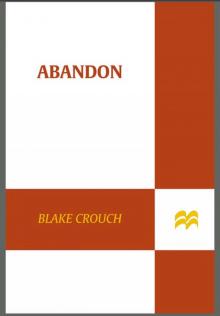 Abandon
Abandon Break You
Break You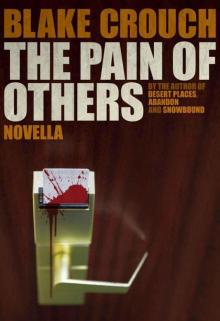 The Pain of Others
The Pain of Others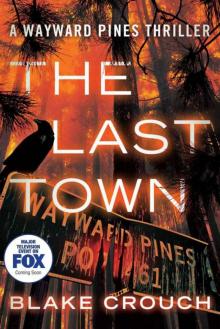 The Last Town
The Last Town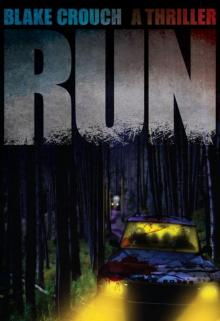 Run
Run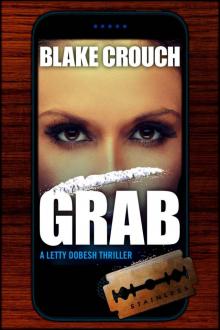 Grab
Grab Four Live Rounds
Four Live Rounds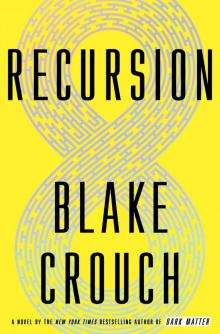 Recursion
Recursion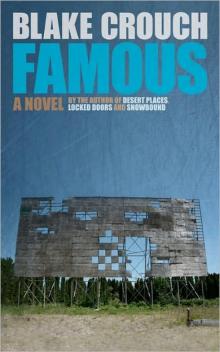 LUMINOUS BLUE: A Novel of Warped Celebrity
LUMINOUS BLUE: A Novel of Warped Celebrity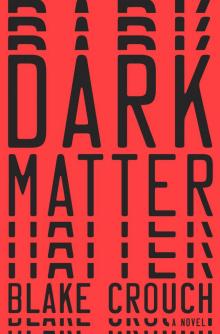 Dark Matter
Dark Matter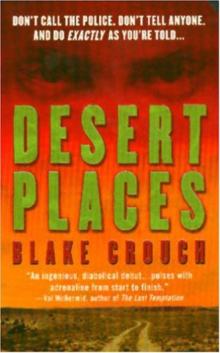 Desert Places
Desert Places Thicker Than Blood - the Complete Andrew Z. Thomas Series
Thicker Than Blood - the Complete Andrew Z. Thomas Series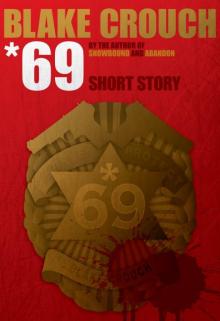 *69
*69 Locked Doors
Locked Doors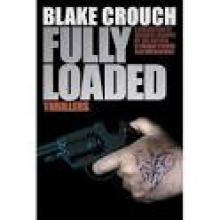 Fully Loaded Thrillers
Fully Loaded Thrillers![Summer Frost [Forward Collection] Read online](http://i1.bookreadfree.com/02/summer_frost_forward_collection_preview.jpg) Summer Frost [Forward Collection]
Summer Frost [Forward Collection]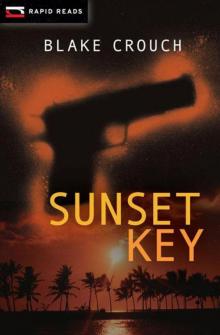 Sunset Key
Sunset Key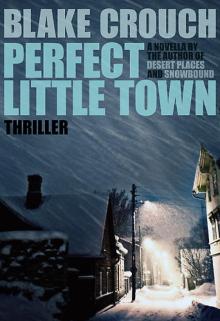 Perfect Little Town
Perfect Little Town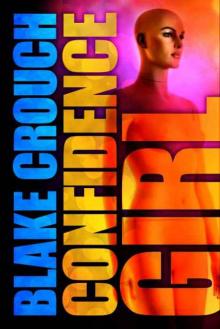 Confidence Girl
Confidence Girl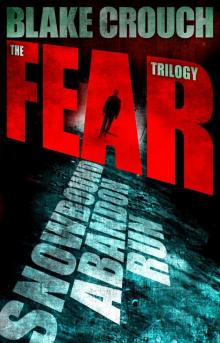 The Fear Trilogy
The Fear Trilogy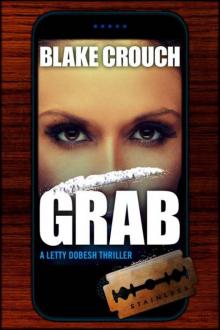 Grab ldm-3
Grab ldm-3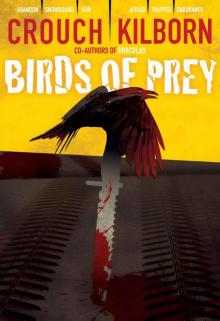 BIRDS OF PREY - A Psycho Thriller
BIRDS OF PREY - A Psycho Thriller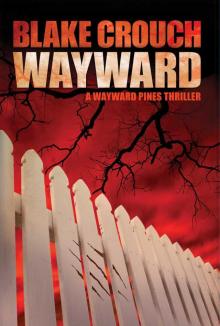 Wayward (The Wayward Pines Series, Book Two)
Wayward (The Wayward Pines Series, Book Two) Hunting Season: A Love Story
Hunting Season: A Love Story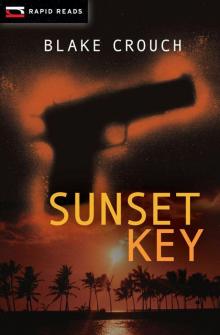 Sunset Key (Rapid Reads)
Sunset Key (Rapid Reads)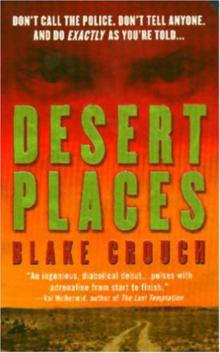 Desert Places: a Novel of Terror
Desert Places: a Novel of Terror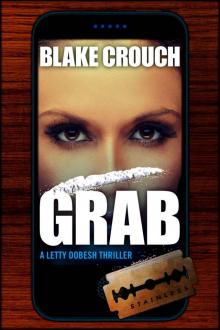 Grab (Letty Dobesh #3)
Grab (Letty Dobesh #3)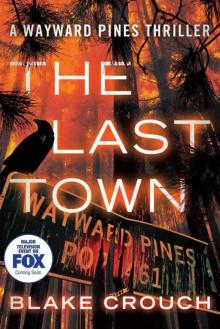 The Last Town (The Wayward Pines Trilogy 3)
The Last Town (The Wayward Pines Trilogy 3) LOCKED DOORS: A Novel of Terror (Andrew Z. Thomas Thriller)
LOCKED DOORS: A Novel of Terror (Andrew Z. Thomas Thriller) BREAK YOU: A Novella of Terror (Prequel to Stirred) (Andrew Z. Thomas/Luther Kite)
BREAK YOU: A Novella of Terror (Prequel to Stirred) (Andrew Z. Thomas/Luther Kite)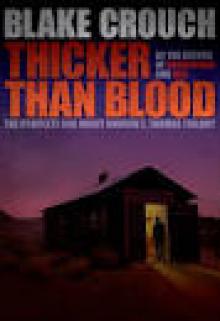 Thicker Than Blood - The Complete Andrew Z. Thomas Trilogy
Thicker Than Blood - The Complete Andrew Z. Thomas Trilogy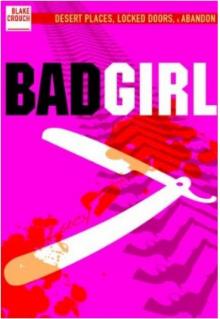 Bad Girl
Bad Girl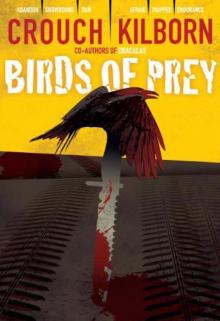 Birds of Prey
Birds of Prey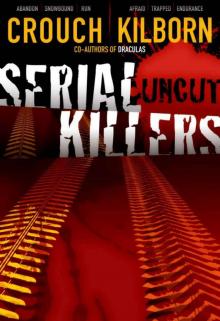 SERIAL KILLERS UNCUT - The Complete Psycho Thriller (The Complete Epic)
SERIAL KILLERS UNCUT - The Complete Psycho Thriller (The Complete Epic) Wayward (The Wayward Pines Trilogy, Book 2)
Wayward (The Wayward Pines Trilogy, Book 2)